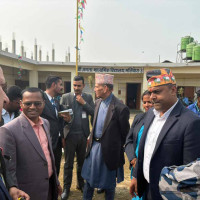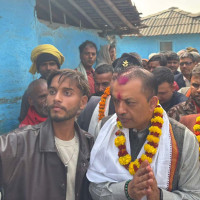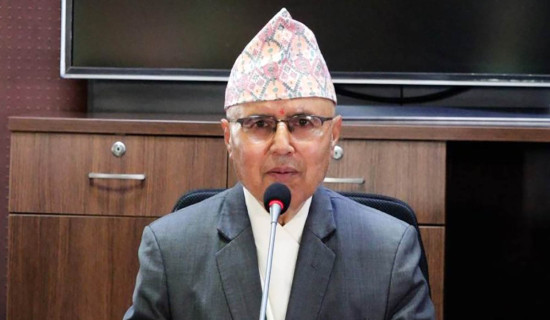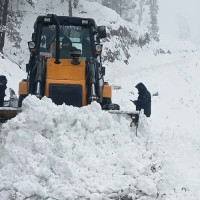- Wednesday, 28 January 2026
Mindful Education Promotes Just Peace
Mindful education promotes a peaceful milieu. A holistic approach to managing conflict requires not only its de-escalation but also knowing and uprooting its basic causes. Peace indicators grow with civic norms, values, skills and behaviour whereby people prefer to live in harmony with other people and respect their dignity. Peace education instils non-violent communication across social divides, learning of each other’s perceptions, needs, rights and aspirations. It equally enables one to reflect on the condition of living and reform social, economic and political structures, laws and policies and authorities of governance.
The rationalistic education despises the hierarchical values and cherishes the ideals of freedom and equality. But it breeds intra-societal strife for power. Search for a common ground requires value-based education to create a just order in society and obviate coercion in social ties. Nepal has cultivated conflict management, not conflict transformation, to prevent the nation’s relapse into violence. Vocational education differs from peace education. The former pertains to career job prospects and meets the functional needs of society, while the latter is about the promotion of the normative order of empathy, justice and reconciliation.
Social responsibility
Commercialised education caters to the market needs but widens the emotional gap in socialisation. Mindful education grounded in human psychology addresses the vital needs of people beyond the elites’ greed. It unlocks people’s overall cognitive, social and emotional life and translates the purpose of education. Students are mentally over-stretched to satisfy their parents’ urge for outperformance in the exam rather than building moral character capable of taking social responsibility.
Under the Gurukul education system, people from all strata had access to mutual learning and critical discourse. Its scriptures are perfected with peace rituals. Nepal's constitution embraces the right to education and the right to peace. Yet a gap persists in public and private education in terms of quality. Education makes people better disciplined and accountable to social duties and capable of dealing with certain problems of unfairness, inequality, disaffection and conflict and struggle for a level playing field.
Nepal’s educational institutions are less attuned to dissociate from rote learning to whet students’ curiosity. Most teachers claim themselves as authority on knowledge and like those students who blindly follow their preaching. Neither students nor the teachers’ union is engaged in the spirit of inquiry about educational problems to craft public policies essential for a stable peace. A lack of contextual sensitivity deprives them of the spirit of dialogue. The main obstacles to mindful education are devoid of contextual feeling, cramming of passages from dead books, loss of creative imagination and drain of innovation to meet educational quality.
Patronage-based recruitment has barred talented, non-partisan teachers in academia. Students' and teachers' baffling activism hamper the regular education, timely exams and qualified graduates. The nation’s store of peace is not amply imbibed in educational inquiry. The domain is left to priests, not the government, business, political parties and NGOs. It is important to tell peace actors, conflict drivers and stakeholders as to how the nation’s heritage of peace spread worldwide and its ideals of compassion, tolerance and empathy shaped the conduct of people. Buddha did not make peace education a project but a life process for reconciling various fissures of society, enthusing awareness of common nationality and shared humanity. Nepal, with 125 ethnic and caste groups, 123 languages and countless cults, entails bonding and bridging links for a peaceful future.
Mindful education has an intrinsic power to uplift the life chances of people, their human rights and the elimination of the future source of violence arising out of the denial of basic needs and rights. Knowing its worth, colleges and universities in Nepal have introduced conflict and peace studies to educate the younger generation about concepts and values of peace and conduct research to inform public policy. Still, a gap exists between education, research, policy and activism of peace builders and a lack of coherent peace infrastructures and peace initiatives.
Investment in peace education suitable for nation building demands grounded reflection and sustaining constructive change. What it needs is outreach to all segments of society about the costs of conflict and the benefits of peace to settle the crime against peace procrastinated by transitional justice. The social inclusion and social justice is expected to ease the transition to peace-promoting behaviour of Nepalis. The criminal justice system needs to address human rights abuses.
Economy of peace
Education must be handy even for the poor to enhance the economy of peace -- production, trade and distribution of public goods, not extraction, fraud and loot. It offers every Nepali’s social progress and nourishes the circle of peace allies, such as Mothers Groups, NGOs for women, peace and security, youth and peace, etc., to exert social pressure to erase the irrationality of violence. The Local Peace Committee has equally played a key role at the grassroots level. Now, a unit of each local government has a dispute settlement committee entitled to provide cost-effective mediation.
Mahatma Gandhi said, “If we are to reach real peace in this world and if we are to carry on a real war against war, we shall have to begin with the children and if they will grow up in their natural innocence, we won’t have to struggle, we won’t have to pass fruitless ideal resolution, but we shall go from love to love and peace to peace”. An educated person is open-minded with a kind heart. Mindful education aims to reduce poverty, infuses civic duties and values of solidarity. Such education built into the curriculum of institutions evokes emotional maturity, whereby people learn to feel and experience the webs of life. Peace is a non-negotiable right of Nepalis, and education is a common good. Their natural ties can contribute to enduring peace in the nation.
(Dahal holds an MA in Peace and Conflict from Otto-Von Guericke University, Germany)
















